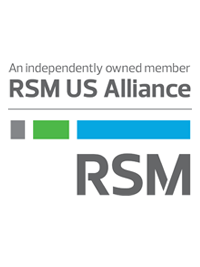Source: RSM US LLP. PBMares is a member of RSM US Alliance.
How does the pass-through deduction impact deal making and portfolio companies?
Partnerships (and LLCs taxed as partnerships) are common vehicles for the portfolio companies that private equity funds acquire. As such, they may be eligible for the new pass-through deduction of the Tax Cuts and Jobs Act, which can eliminate tax on up to 20 percent of the entity’s income. The deduction is granted by section 199A and is often referred to by that name. Even if the 20 percent deduction does not apply to the fund itself – because the fund is not engaged in a trade or business — it may apply to the underlying portfolio company. This adds to other tax advantages of the partnership form for portfolio companies.
The new 20 percent deduction may be more advantageous than the reduced corporate tax rate available to corporations under the new tax law. For one thing, the corporate rate of 21% is only part of the story. Although that rate may be very beneficial if earnings are reinvested in the business, upon a distribution of earnings or the sale of the corporate stock or assets there typically are additional taxes. The all-in tax rate for corporate income distributed to an individual investor (or realized from the sale of corporate stock) consists of a 21% corporate tax and a 23.8% tax on the capital gains from a dividend or sale of shares. This can raise the all-in rate to approximately 39.8%. In contrast, the all-in rate on the operating income of an individually-owned pass-through entity enjoying the 20 percent deduction is closer to 29.6%. Finally, for a pass-through entity, if the business assets are sold there is only a single capital gains tax on that share – not a corporate tax and a shareholder tax.
However, unlike the reduction in the C corporation tax rate, the new 20 percent pass-through deduction is not available to all businesses. Many service businesses in particular are excluded. In addition, even those who are not excluded will have to meet specific requirements related to the payment of wages or the ownership of certain types of business property. Accordingly, a complete analysis of these new provisions must be done when evaluating current or potential portfolio company investments.
Which investments will qualify for the deduction?
While there are many factors that affect eligibility, an initial analysis will generally ask:
Is the investment generating business or investment income?
The deduction is only available against “qualified business income.” Therefore, if the primary source of income from the portfolio company will be the payment of interest, guaranteed payments for the use of capital, dividends, capital gains, or other “investment income”, the deduction may not provide a benefit.
Is the income earned domestically or abroad?
Foreign income is not eligible for the deduction. Generally, only domestic business income that would be considered “effectively connected income” will qualify.
Does the business earn “specified service” income that is ineligible for the deduction?
Although exceptions exist for lower income investors, the deduction will generally not be available against income earned from “specified service” activities. Further, if more than a de minimis amount of a business’ income is from one of these areas, it disqualify all income of the business.
This exclusion does not necessarily prevent all service business from qualifying – but instead prevents certain specific industries from claiming benefits. While some of these prohibited income sources are well defined (such as accounting or law) others are less clear (consulting and health) In general, the deduction is not available against income earned in the fields of:
- Health
- Law
- Accounting
- Actuarial science
- Performing arts
- Consulting
- Athletics
- Financial services
- Brokerage services (not including real estate or insurance brokerage)
- Investing and investment management
- Trading or Dealing in securities, partnership interests, or commodities
- Endorsing products or services,
- Licensing an individual’s image, likeness, name, signature, voice, trademark
- Receiving fees for appearing at an event or on radio, television, or another media format
Does the business pay sufficient wages or hold depreciable assets?
The deduction is further limited (again with exceptions for lower-income investors) based upon the wages paid or depreciable assets held by the business. If the business is not labor-intensive, and does not hold significant depreciable property – investors may not see the full benefit.
How is the deduction claimed?
Although portfolio companies will generally calculate the key factors, this information is passed along to investors who bear the ultimate responsibility for calculating the deduction – as the benefit is claimed at the partner level. In some cases, this will be straightforward and the complexity will be worth it in terms of tax benefits. In other cases, the cost of compliance may be high in relationship to the potential tax benefits.
Section 199A is a key component of tax structure analysis
Understanding the impact of the 20 percent deduction authorized by section 199A of the tax code is important, as it will affect decisions related to the choice of form for portfolio entities, structuring options, and the decision of whether to acquire or dispose of certain entities. There also will be issues related to compliance and the payment of tax distributions. The need for knowledgeable and experienced tax advisors is more important than ever.
This article was written by Nick Passini and originally appeared on January 7, 2019.
© 2019 RSM US LLP. All rights reserved. View original article here.
The information contained herein is general in nature and based on authorities that are subject to change. RSM US LLP guarantees neither the accuracy nor completeness of any information and is not responsible for any errors or omissions, or for results obtained by others as a result of reliance upon such information. RSM US LLP assumes no obligation to inform the reader of any changes or other factors that could affect information contained herein. This publication does not, and is not intended to, provide legal, tax or accounting advice, and readers should consult their tax advisors concerning the application of tax laws to their particular situations. This analysis is not tax advice and is not intended or written to be used, and cannot be used, for purposes of avoiding tax penalties that may be imposed on on any taxpayer.
RSM US Alliance provides its members with access to resources of RSM US LLP. RSM US Alliance member firms are separate and independent businesses and legal entities that are responsible for their own acts and omissions, and each are separate and independent from RSM US LLP. RSM US LLP is the U.S. member firm of RSM International, a global network of independent audit, tax, and consulting firms. Members of RSM US Alliance have access to RSM International resources through RSM US LLP but are not member firms of RSM International. Visit rsmus.com/aboutus for more information regarding RSM US LLP and RSM International. The RSM(tm) brandmark is used under license by RSM US LLP. RSM US Alliance products and services are proprietary to RSM US LLP.





